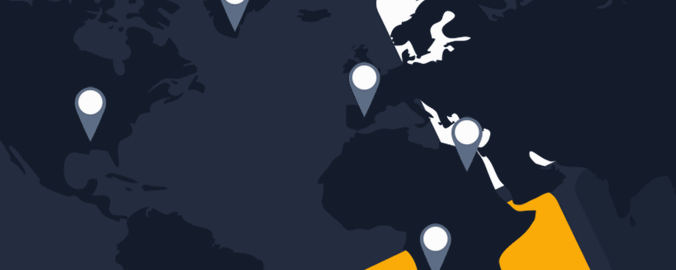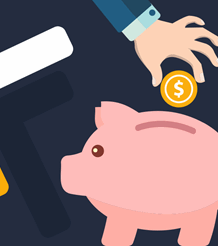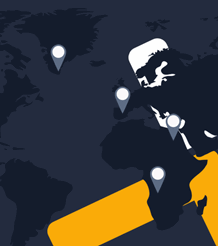
France Region Guide
France, the largest country in Western Europe, borders Luxembourg, Belgium, Germany, Italy, Monaco, Spain and Switzerland. This central location and ease of border crossings, makes it ideally located for foreign trade and visitors.
A wide variety of scenery awaits you, from the fertile plains and gently rolling hills of the north, moving southwards to the mountains of the Massif Central, and the majestic Alps and Pyrenees in the south, with the highest point at Mont Blanc rising to 4,808 meters. Coastlines are equally varied and range from the dramatic Atlantic to the west to the chic Mediterranean Riviera to the south. Whether you seek cosmopolitan Paris, picturesque, unspoiled country villages and chateaux, ski, golf or beach resorts, France offers a unique sense of charm and quality of life every step of the way. Culturally France offers fine arts, music, theater, history and world-famous food and wine - - it is easy to see why it is Europe's most popular tourist destination.
France enjoys mild winters and long hot summers along the Mediterranean shores in the south. The rest of the country is cooler than in the south, but boasting warmer summer temperatures than in the UK.
Both World Wars brought many losses for France in terms of land, wealth and population. Following this period, relationships with France and Germany were completely destroyed while today they have become reunited under the framework of the European Union. As an economic leader of the European nations, France's socialist government puts defence, taxation, controlled social spending and monetary union at the forefront of its political agenda and provides a stable economic and political climate for foreign investors.
Information Required When Travelling to France
Visas
Visitors from EU member states are allowed to stay in France unlimited time but you must have.
If you are from Australia, Canada or USA and wish to stay longer than 90 days, you will need to apply to your nearest Embassy for the necessary documentation.
Vaccinations
None, however it is recommended to keep up to date with tetanus and polio vaccinations.
Time Zone
+ 1 hour GMT (winter), + 2 hours GMT (summer)
Electricity
220 volts
Weights and Measures
Metric system.
Tel. Dialing Code
00 + 33 +
Lille 3 Marseilles 4
Paris 1
Rouen 2
Toulouse 5
Natural Beauty
France is a vast country, two and a half times the size of the UK and with a population of about the same as the UK, there is no shortage of open spaces and unadulterated countryside. Enormous stretches of coastline bordering the Atlantic, Mediterranean and English Channel offer varied coastal beauty, from rocky coves to cliff faces or large stretches of golden sands. Dramatic mountain ranges give way to hilltop villages and vast plains all making for a great abundance of natural beauty and experiences all within one country. These features make France an ideal holiday location and, for many, a highly desirable country in which to live.
Sightseeing
It is easy to see why France is the World’s most visited country. It abounds with fantastic cities that are brimming with cultural activity, including art exhibitions, music, dance, theater and historical monuments, ideal for cultural tourism. Alternatively there are many opportunities to enjoy the French countryside, from magnificent chateaux, to vineyards or numerous pretty rural towns and villages. Sporting activities such as hiking, world class skiing and water sports can also be enjoyed, giving France an all round appeal to satisfy just about anyone who visits.
Culture
France is famous for its chic sense of style in many aspects of living from its exquisite cuisine, to the fashion industry and its ornate art and architecture. The French lifestyle continues to draw foreigners to its soil. Famed for its civilized and relaxed pace of life, France holds a strong attraction for those simply visiting or even seeking to relocate to France while remaining only a relatively short distance from “back home”.
Climate
France’s climate tends to be milder than in the UK, while on the French Riviera in the south, summer temperatures are at their hottest, soaring to around 32°C. Meanwhile in Eastern France and inland, you will experience greater variations in temperature with cold winters and warm to hot summers. This makes for a pleasant climate in which to purchase your property.
Accessibility
Close proximity to the UK and rest of mainland Europe makes France an ideal location in which to buy your property. You can fly via many budget airlines to almost any major city in France from the UK. Cross Channel ferries or the Channel Tunnel all allow fast and easy access to France with your car, while an efficient road system allows stress free onward travel to any destination. This ease of access further fuels the tourist industry as a whole and maintains the value of your property investment.
Driving in France
Complete with 950,000 kilometers (600,000 miles) of well maintained roads, including 11,000 km (6,800 miles) of motorways, France has one of Europe's busiest and most efficient road networks, offering excellent connections to the rest of Western Europe.
The French are notorious for their fast driving and you will need to pay some extra attention particularly in and around Paris. Driving on the right hand side of the road also calls for extra concentration, particularly when you are pulling away from a parking space or petrol station but it is surprising how quickly British drivers adapt to this change.
Tips to Help You Drive Safely and Legally in France
- It is illegal to drive with side lights on, so you will need to have lights switched on in all poor visibility.
- Headlamp converter stickers are compulsory.
- Warning triangles must be placed on the road 30 meters behind a broken down vehicle.
- Identifying roads: Motorways are prefixed by the letter “A” and national roads with the letter “N”. “D” roads are minor roads that are yellow on the roadmaps.
- Parking laws are strict, particularly in large cities, and you could be fined on the spot or have your car towed away if you park in the wrong place. Many towns have pay-and-display machines, with free parking often between noon and 13:30 hrs. Parking is also normally free of charge from 19.00 – 09.00 hrs and on weekends, public holidays and the month of August.
- Speed limit: Motorways, 130kph. Towns, 50kph. Major roads, 110kph.
- Speeding is subject to on the spot fines.
- Drink driving is heavily penalised. The limit is 50mg blood/alcohol level. Your license will be taken off you immediately and you could face fines of up to 30,000ff and 2 years in jail.
- Seatbelts are compulsory in the front and back of your car, while children under 10 must travel in the back.
- Motorbike helmets must be worn for mopeds and motorcycles and stiff fines are enforced for non-compliance
- The minimum driving age is 18 years old
- Documentation required: You will need an international driver’s license, insurance certificate (Green Card), registration document and car ownership papers to drive in France
- If you have an accident involving another driver, you will need to note down the registration number of the other vehicle then go with the other driver to find a policeman, who will complete a police report in triplicate for presentation to the insurance company.
- Emergency telephone numbers for incidents on the road: Police/Ambulance, 17. Fire, 18.
French Cuisine
Food and drink are synonymous with France and its exquisite cuisine will stay firmly lodged in the memories of all who visit. The French can spend hours over a meal and lunchtimes are often lengthy affairs with several courses of freshly cooked meat and vegetables, often laced in delicious sauces and washed down with fine French wine. This, together with plenty of loud banter, makes for a pivotal part of the French day.
Some of the world’s most famous chefs are from France and international experts flock here to sample and learn from French cuisine, while also contributing their expertise to some of the top restaurants of major chic cities such as Paris and Nice. Most French restaurants will offer a range of set menus at various prices, where there is a choice of two or three dishes per course. These menus normally include wine and coffee and are generally cheaper than ordering a la carte.
Dishes vary from region to region, depending on the local produce available. Butter, cream and apples characterise the cuisine in northwest France, while in southwest France, duck, fois gras, mushrooms and gizzards are widely used for cooking. In southeast France, Mediterranean style olive oil, herbs and tomatoes are eaten. Along the border with Belgium, beer, endives, pork and potatoes are commonly found while on the German border you will eat plenty of sausages, beer and sauerkraut.
Popular Dishes in France
- Tournedos (steak wrapped in bacon),
- Entrecôte (rib eye steak)
- Gigot de présalé (leg of lamb)
- Bouillabaisse (thick Provencal fish stew)
- Boeuf Bourguignon (beef stew with red wine, onions and mushrooms)
- Escargots (snails normally cooked in wine and garlic)
- Foie gras (duck pate)
- Oysters, mussels, shrimps, often served with garlic, herbs and olive oil.
- Flageolets (thin green beans)
- Chalottes (small French onions)
- Gratin dauphinois (baked sliced potato in cheesy white sauce)
France is famous for its “Boulangeries” selling freshly baked breakfast pastries, including French toast, croissants and brioches, often served with chocolate or strong coffee in large, shallow cups. Another integral part of the French diet is cheese and many varieties can be enjoyed from all over the country, the most famous cheeses being Camembert, Brie, Roquefort and chevre. Cheese is not only used as an ingredient but also to accompany France’s fine wines after a meal.
France has been producing wine since the Roman Empire and traditionally vineyards were later maintained by monks who used it to generate income. Over the years, French nobility acquired extensive vineyards and today France produces the most wine by value in the world, the most important of which being Bordeaux, Bourgogne and Champagne. The French population drinks wine for any occasion as a staple part of their daily diet and even children are often served wine mixed with water from a young age. Beer is also a popular drink produced in France, with light lagers commonly drunk from small bottles. Alsace is the most famous brewing region of France.
Healthcare in France
Not only is France a worldwide number one in terms of tourism, in 2000, it was also voted by the World Health Organisation to have the best healthcare system in the world.
With over 3,000 hospitals in France and a well administered social security system, to which employees contribute 20% of their salaries, you are sure to benefit from excellent facilities should you have the misfortune to require medical treatment.
For fellow EU residents, healthcare in France is easily accessible. As a British resident you will be able to benefit from free treatment, provided you have completed one of the following forms:
E111 For short visits for a few weeks at a time, this form entitles you to free emergency treatment. You will need to present it at the French hospital or medical center in order to seek treatment.
E106 For non-working stays of over 3 months, the E106 allows you to obtain free treatment for up to two years, after which time you will need to either make contributions to the state social security system as a self-employed person or employee, or take out your own private medical insurance.
E121 This form entitles you to free healthcare in France if you are in receipt of a pension from your EU country of origin.
Note: the above forms do not usually cover the cost of all treatments in their entirety, such as for long term or serious illnesses. Any treatment claimed for via a form will have to take place in state approved medical centers or hospitals.
France offers a huge range of general practitioners and health specialists which are famed to be among the best in the world. Medical fees, including dentistry vary enormously in France, so it is wise to check on prices prior to treatment. The local social security office will be able to provide you with a list of practitioners in town that will charge the standard social security rates.
There is no state coverage for consultations with psychologists and psychoanalysts, osteopaths or chiropractors, so you will need to ensure you have a private insurance policy to cover regular treatment in these fields.
Crime and Police in France
As a visitor to France, it is unlikely you will fall victim to crime, provided you take reasonable precautions against petty crimes such as theft and pickpockets in large cities or at major tourist attractions. It is important to remember that these types of crime are as common in France as in any civilised European country. Particular black spots are the RER train line B in Paris leading to Charles de Gaulle airport where pickpockets and thieves seek easy targets, and if you are driving, you will need to take care to leave tempting objects out of sight in a locked car. Other normal precautions such as keeping your money safe, your bags well closed and constantly attended and valuable items such as cameras out of sight are important at all times, particularly in busy cities, while if all else fails, a good insurance policy could save the day.
Your property in France will be generally safe if you take reasonable security measures, as you do “back home”. Rural property is even safer where the crime rate is predictably far lower than in the cities.
Should you fall victim to a crime, it is advisable to report it to the local Commissariat de Police where you can fill in a declaration (constat de vol). If you require police assistance you can also dial telephone number 17.
Drug offences, no matter how small, are dealt with seriously in France as in the UK and offenders may find themselves in prison, while consulates will be unhelpful and unsympathetic.
French police forces consist of the Police Nationale for civilian law enforcement and the Gendarmerie Nationale for the military forces and security at airports as well as in certain public buildings.



